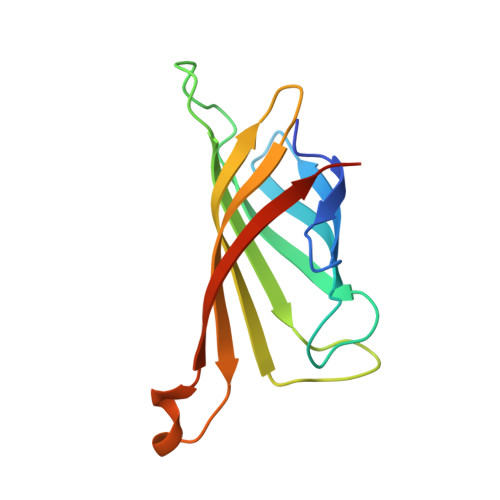A structural snapshot of an intermediate on the streptavidin-biotin dissociation pathway.
Freitag, S., Chu, V., Penzotti, J.E., Klumb, L.A., To, R., Hyre, D., Le Trong, I., Lybrand, T.P., Stenkamp, R.E., Stayton, P.S.(1999) Proc Natl Acad Sci U S A 96: 8384-8389
- PubMed: 10411884
- DOI: https://doi.org/10.1073/pnas.96.15.8384
- Primary Citation of Related Structures:
1SWS, 1SWT - PubMed Abstract:
It is currently unclear whether small molecules dissociate from a protein binding site along a defined pathway or through a collection of dissociation pathways. We report herein a joint crystallographic, computational, and biophysical study that suggests the Asp-128 --> Ala (D128A) streptavidin mutant closely mimics an intermediate on a well-defined dissociation pathway. Asp-128 is hydrogen bonded to a ureido nitrogen of biotin and also networks with the important aromatic binding contacts Trp-92 and Trp-108. The Asn-23 hydrogen bond to the ureido oxygen of biotin is lengthened to 3.8 A in the D128A structure, and a water molecule has moved into the pocket to replace the missing carboxylate interaction. These alterations are accompanied by the coupled movement of biotin, the flexible binding loop containing Ser-45, and the loop containing the Ser-27 hydrogen bonding contact. This structure closely parallels a key intermediate observed in a potential of mean force-simulated dissociation pathway of native streptavidin, where the Asn-23 hydrogen bond breaks first, accompanied by the replacement of the Asp-128 hydrogen bond by an entering water molecule. Furthermore, both biotin and the flexible loop move in a concerted conformational change that closely approximates the D128A structural changes. The activation and thermodynamic parameters for the D128A mutant were measured and are consistent with an intermediate that has traversed the early portion of the dissociation reaction coordinate through endothermic bond breaking and concomitant gain in configurational entropy. These composite results suggest that the D128A mutant provides a structural "snapshot" of an early intermediate on a relatively well-defined dissociation pathway for biotin.
Organizational Affiliation:
Department of Bioengineering, University of Washington, Seattle, WA 98195, USA.















